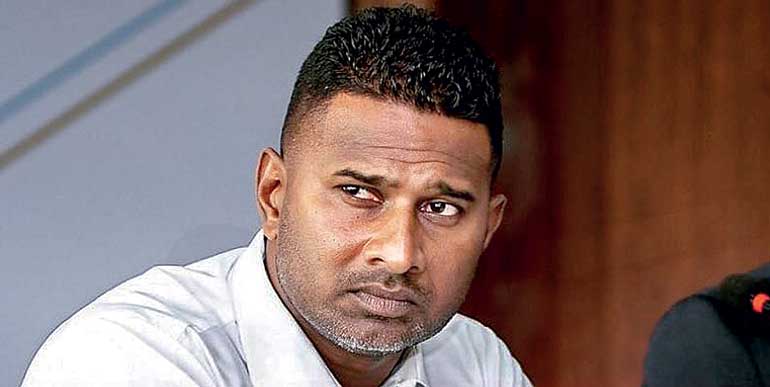Monday Mar 02, 2026
Monday Mar 02, 2026
Tuesday, 28 September 2021 02:41 - - {{hitsCtrl.values.hits}}

Sri Lanka Under-19 Head Coach Avishka Gunawardene
By Sa’adi Thawfeeq
The Under-19 cricket World Cup has been held on 13 occasions since the first edition in 1988, and amongst the four nations in the Asian region, Sri Lanka are the only country that has not won it even once.
India has won it on four occasions (2000, 2008, 2012, 2018); Pakistan twice (2004, 2006); and Bangladesh once (2020).
Presently, Sri Lanka is preparing for the 14th edition of the Under-19 World Cup to be held in West Indies in January 2022, but for the team’s Head Coach Avishka Gunawardene, the Under-19 age group is where you pick the talent that will go on to represent the country.
“Under-19 cricket is not purely about winning and losing. Yes, when you go for a World Cup you try to win, you play a series against another team you try to win, but in my book, this is an age where you pick talent and lay the foundation for the cricketers, then try and recognise who is going to go to the next level,” said Gunawardene.
“Some might make it in a couple of years, some might take more time than the others to improve to go to the next level. The most important thing is to identify talent, and if you think they should be fast-tracked, you should do that, and for some you put a long-term plan. That’s basically the idea here when it comes to Under-19 junior level cricket.”
To emphasise his point Gunawardene said: “I was handling the Under-19 squad which went to the Under-19 World Cup in 2016 in Bangladesh under Charith Asalanka. We made it to the semi-finals and lost to India. Avishka Fernando, Kamindu Mendis, Wanindu Hasaranga, Lahiru Kumara and Asitha Fernando were all in that Under-19 team which I handled. Straight after that World Cup, these players moved into the ‘A’ team.”
Five of them – Avishka Fernando, Charith Asalanka, Wanindu Hasaranga, Kamindu Mendis and Lahiru Kumara – are members of the Sri Lanka squad picked for next month’s T20 World Cup in UAE.
Giving reasons why Sri Lanka has been unable to win an Under-19 World Cup, Gunawardene said: “If you take teams like India and England, those players, at a very young age, start playing first-class cricket, so they come to an Under-19 tournament with first-class cricket experience behind them.
“Our school structure is such that the players won’t have much time to play first-class cricket. That’s a bit of a disadvantage for our boys when you go into a big tournament like the World Cup. When we made it to the semi-finals of the 2016 Under-19 World Cup against India, what made the difference was there were two or three players who had already played IPL cricket in that Indian team.”
For the record, the Indian Under-19 side had players like Rishabh Pant, Ishan Kishan (Captain), Washington Sundar and Khaleel Ahmed.
“I don’t think any of the players who are in the squad right now have played a first-class game, whereas if you take the other nations, even Bangladesh, there are players who have played first-class cricket. That might be one of the reasons why we haven’t been able to go ahead and win a World Cup. We definitely have the talent, but I think the main idea in Under-19 cricket is to identify talent and groom them.”
Gunawardene, a former Sri Lanka Test and ODI cricketer, has shown that he has the knack of spotting and picking talent. He puts it down to being in the system for almost 28 years as a cricketer and as a coach.
“The first tour I went with the Sri Lanka team was in 1992 as a schoolboy with the Under-19 side and since then I have been involved in the system. I have played and when I was almost stopping cricket I started my coaching,” said Gunawardene.
“For almost 28 years, I have never left the system. I have been involved as a player and as a coach. This is actually my 14th year as a coach; I am 44. I was coach at SSC for seven years, Director of Cricket at Royal College, handled so many provincial sides as Head Coach, involved in the first SLPL team which won the final, then with the Sri Lanka Under-19, Sri Lanka ‘A’ and Emerging teams. So basically, I have been involved and worked with each and every stage of cricket. That’s one of the key points that I am able to identify and understand players.”
“You need to understand the culture where these boys come from. I have that knack to understand players because I know their culture very well. Working with an open mind, being straightforward and being transparent, I have won the trust of the players,” said Gunawardene, who is an ICC Level 3 qualified coach.
“I personally feel it’s just a qualification behind your back. The most important thing is experience, which you can’t buy anywhere. Having a paper qualification is important, but more than that, what you require is the experience that you have, which obviously is not available to buy anywhere.”